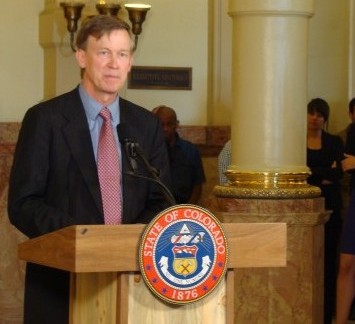
[Photo: Governor Hickenlooper announcing his decision in the Dunlap case at the Capitol. CPR/MVerlee]
The state’s first execution in more than fifteen years is on hold. Governor John Hickenlooper announced Wednesday he’s staying the execution of convicted murderer Nathan Dunlap, who was scheduled to die in August. Some call the governor’s decision courageous. Others say it wasn’t a decision at all.
[The following is a transcript of Megan Verlee's report.]
Reporter: Governor Hickenlooper says he’s long wrestled with the question of what to do about Nathan Dunlap.
Governor John Hickenlooper: "Is it just and moral if we make the decision to take this person’s life? Is it a benefit to the world?"
Reporter: The governor’s conclusion was, no it’s not. Hickenlooper says he wasn’t moved by compassion for Dunlap, who was convicted of killing four people in an Aurora pizza restaurant in 1993. Instead the governor spoke of his growing unease with the death penalty itself and how it’s carried out. There are currently only three men on Colorado’s death row. All are black. And all were convicted in the same judicial district.
Gov. Hickenlooper: "So many meet the legal criteria for capital punishment and yet it’s so rare that anyone is sentenced to death. And I know that has been taken as an argument of why the system’s working. But I think it’s also a pretty compelling argument of the inequity of the system."
Reporter: By granting a temporary reprieve, Hickenlooper has managed to find something like a middle ground. Dunlap almost certainly won’t be put to death during Hickenlooper’s remaining time in office, but he will stay on death row, and any future governor could lift the stay and start the lethal injection clock ticking again.
After the governor’s announcement, District Attorney George Brauchler called the decision unacceptably ambiguous.
George Brauchler: "This is inaction, this is shrugging. This is not justice."
Reporter: Brauchler represents the district that prosecuted Dunlap, although he wasn’t in office at the time. He accused Hickenlooper of putting his own doubts ahead of the considerations of the judge and jury when they imposed the death penalty nearly two decades ago, and of second-guessing the rest of Colorado’s legal system as well.
Brauchler: "Seventeen years of subsequent appellate review by Colorado judges... all found that this process was fair and just and the outcome should be carried out."
Reporter: It’s unclear whether Hickenlooper’s decision will have a larger impact on the use of the death penalty in Colorado. The governor will be out of office before the other two men on death row would potentially seek clemency or a stay. Also unclear is how this will play out politically. Hickenlooper voiced support for capital punishment during his first run for governor, but he’s been public about his ambivalence since then. Yesterday, one of his possible opponents for re-election, Republican state Senator Greg Brophy, was quick to criticize the stay.
Sen. Greg Brophy (R-Wray): "Because it lacked the courage of his convictions. He clearly wanted to grant clemency but doesn’t have enough courage to do that, so he punts on this decision. What a gutless way to go."
Reporter: Hickenlooper may have to explain his shifting death penalty views to voters next year, but in the short term, his decision did hearten some death penalty opponents, including Dunlap’s attorney, public defender Madeleine Cohen. She hopes all involved can find some closure in the governor’s decision, although she admits that won’t be easy.
Madeleine Cohen: "I know that an indefinite stay is probably the least closure-producing outcome, but it gives us all a chance to step back and look at the death penalty and what it means in our society."
Reporter: The governor says he too wants a larger discussion in Colorado about whether the death penalty is still an an acceptable form of punishment, for anyone.








